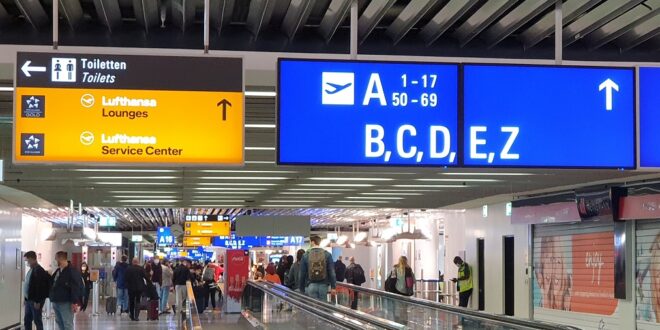There are many legal changes entering into effect in August, including new rules for holiday returnees and a controversial ID card requirement. There is also good news for low-income families and all those who are obliged to file a tax return. The African Courier summarises what will be important for you to know.
——–
Compulsory testing for travellers returning to Germany
From 1 August, travellers entering Germany must provide a negative COVID-19 test result — unless they’re vaccinated or have recovered and they must provide documentation showing that they are fully vaccinated or recovered.
If entering from a virus variant area, even vaccinated persons must still provide proof of a test.
Children under the age of twelve are exempt from the testing requirement. Cross-border commuters and those travelling through the country in transit are also exempted from the rule.
Until now only passengers flying into the country were required to present a negative test result or proof of vaccination or recovery. As from 1 August, the rules apply to all travellers, including those entering the country via car, train or ship.
Moreover, there are now only two types of risk areas, namely High Incidence and Virus Variant Areas. For those entering from these areas, notification or quarantine obligations will continue to apply.
Meanwhile, the vaccination drive is picking up in Germany after getting off to a slow start. Over 61% of the population has now received one dose of the vaccine against COVID-19, according to official figures. Over 51% of the population is now fully vaccinated.
However, coronavirus infection cases and the seven-day incidence value are rising in the country, Robert Koch Institute (RKI), Germany’s centre for disease control, has reported.
And concerns are growing about the highly contagious delta variant and summer holiday returnees pushing up cases in the country.
List of occupational diseases gets longer
The extension of the list of recognised occupational diseases approved by the Federal Council (the upper chamber of the federal parliament or Bundesrat) will also apply from August. Lung cancer triggered by passive smoking and hip arthritis caused by heavy carrying and lifting will be added.
More time for filing tax return
This year, many employees will have to file a tax return for the first time. Namely, if they received short-time allowance in 2020.
However, the federal government is giving all compulsory taxpayers more time. The deadline will be extended by three months. This means that you can still do your tax return in August – or even in September or October.
The last possible date for submitting your tax return is 1 November 2021. If this day is a public holiday in your federal state, the deadline is 2 November.
Children’s leisure bonus for families with low income
In the heat of the coronavirus pandemic, educational and recreational facilities were closed – much to the chagrin of many children and young people. Families with low incomes were hit particularly hard, which is why the state is helping them out with a one-time payment starting in August.
An extra 100 euros per child will then be paid to families as children’s leisure bonus which they can spend on holidays, sports and leisure activities.
Those who already receive a child supplement, basic income support, benefits under the Asylum Seekers’ Benefits Act or the Federal Supply Act automatically receive the bonus. All others must submit an application. You can send the application by post or by e-mail to kinderfreizeitbonus@arbeitsagentur.de.
The payment is part of the Federal Government’s action programme Aufholen nach Corona (“Catching up after Corona”).
Fingerprint obligation for identity cards
What was previously voluntary will become compulsory from 2 August: a new identity card that you apply for must then contain a chip with two of your fingerprints. This is to make the document more forgery-proof. However, old ID cards will remain valid until their expiry date.
With this reform, the federal government is implementing a regulation that was approved by the EU Parliament in 2019.
Critics warn of a possible misuse of the data. Data protectionists criticise the rule as a disproportionate encroachment on personal rights and are considering legal action.
Fingerprints have already been stored in German passports since 2007.
New minimum requirements for training occupations
Four new standards in the learning contents will be set for training occupations from 1 August. All training regulations are then to promote competences in the areas of law, safety, sustainability and digitalisation.
According to the Federal Institute for Vocational Education and Training, the changes aim to keep future skilled workers employable in a changing world of work.
Watch out! Possible strikes at Deutsche Bahn
Rail travellers can relax until 9 August, but after that there may be a strike. This is what Claus Weselsky, head of the German Train Drivers’ Union (GDL), has announced. The GDL is demanding a wage increase of 3.2 per cent for employees and a 600 euro Corona bonus for the current year in the collective bargaining dispute with Deutsche Bahn.
On 9 August, it plans to announce the result of a vote currently being held by GDL members on possible strikes. GDL leader Claus Weselsky expects a high approval rate.
For travellers, this means: From 10 August at the latest, it is advisable to take a look at the Deutsche Bahn website to find out whether your connection is affected. If your train is cancelled or delayed by at least one hour, you can also claim compensation in the event of a strike. By the way, this now also works online.
Femi Awoniyi/African Courier Media
READ ALSO Germany: New laws and other legal changes in July 2021
 THE AFRICAN COURIER. Reporting Africa and its Diaspora! The African Courier is an international magazine published in Germany to report on Africa and the Diaspora African experience. The first issue of the bimonthly magazine appeared on the newsstands on 15 February 1998. The African Courier is a communication forum for European-African political, economic and cultural exchanges, and a voice for Africa in Europe.
THE AFRICAN COURIER. Reporting Africa and its Diaspora! The African Courier is an international magazine published in Germany to report on Africa and the Diaspora African experience. The first issue of the bimonthly magazine appeared on the newsstands on 15 February 1998. The African Courier is a communication forum for European-African political, economic and cultural exchanges, and a voice for Africa in Europe.




































